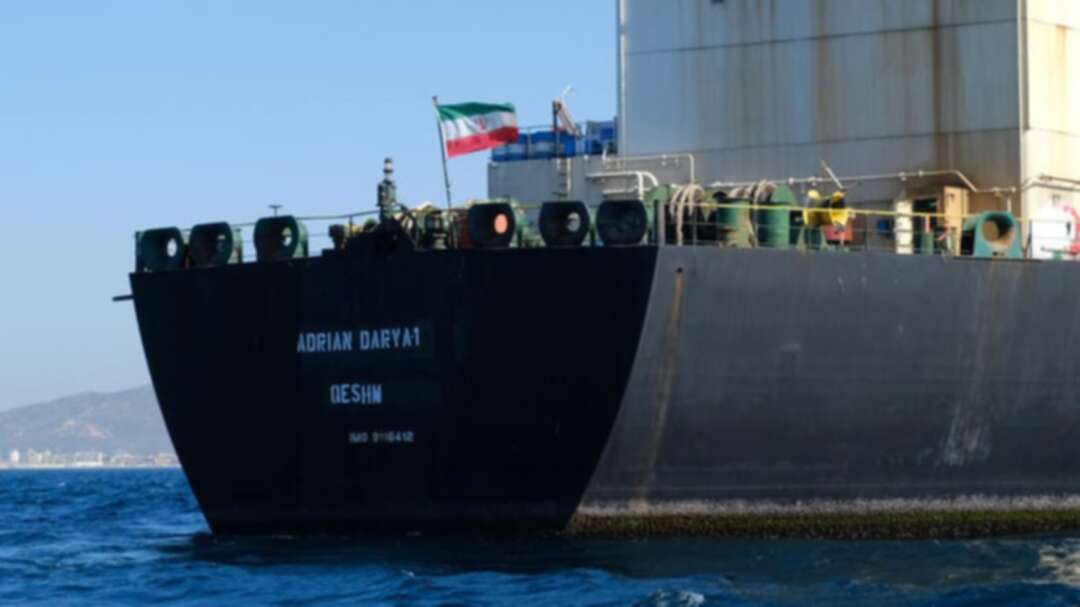-
US sanctions Iranian oil tanker, its captain for ‘selling illicit oil to Syria’

The United States on Friday sanctioned Iranian oil tanker Adrian Darya 1 and its captain for enabling Iran’s Revolutionary Guard Corps to “ship and transfer large volumes of oil… to fund the regime’s malign activities and propagate terrorism.”
This comes shortly after US Secretary of State Mike Pompeo announced that the US had reliable information that the tanker, which is carrying 2.1 million barrels of Iranian crude oil, was headed to Tartus, Syria.
Pompeo had earlier said that if the tanker went to Syria, Washington would take every action it could consistent with US sanctions.
https://twitter.com/SecPompeo/status/1167576352473702401
When the ship was released off Gibraltar in mid-August after a five-week standoff, Iran assured Britain that the cargo was not headed to Syria.
The latest twist sets it in the direction of Syria, and raises the possibility that a ship-to-ship transfer of cargo may be attempted once it nears Lebanon’s coast.
Treasury said the Adrian Darya's captain, Akhilesh Kumar, is also sanctioned under the order, which generally prohibits dealings with the blocked property by US persons.
“Anyone providing support to the Adrian Darya 1 risks being sanctioned. The path to relief is to change course and not allow the IRGC-QF to profit from illicit oil sales,” said Sigal Mandelker, Under Secretary for Terrorism and Financial Intelligence.
Faced with the US warnings, the tanker has been bouncing around the Mediterranean.
Turkey said on Friday that an Iranian oil tanker at the center of a confrontation between Washington and Tehran was headed to Lebanon’s waters.
According to Refinitiv tracking data, the Adrian Darya, formerly called Grace 1, after changing course several times headed on Friday for Turkey’s Iskenderun port, 200 km (124 miles) north of Syria’s Baniyas refinery, the tanker’s suspected original destination.
https://twitter.com/SecPompeo/status/1167621865566810112
Turkish Foreign Minister Mevlut Cavusoglu said earlier on Friday that despite the tracking data, the tanker was “for sure” not going to Turkish ports but rather towards Lebanese waters.
Earlier on Friday, the minister told Reuters the ship was headed to Lebanon’s “main” port. “I didn’t mean that this tanker is going to a Lebanese port, but (rather) according to the information coordinates it is heading to the territorial waters of the country,” he later told reporters at an Oslo forum.
“It doesn’t mean that it is going to reach a Lebanese port,” he said of the tanker that was carrying 2 million barrels of oil when released at Gibraltar. “We are monitoring it very closely.”
In response, Lebanese Finance Minister Ali Hassan Khalil said in a separate interview: “We have not been informed of the Iranian oil tanker Adrian Darya heading (here).”
Western threats
The apparent confusion underlines the risk of reprisal that countries face taking in the tanker, which at 1400 GMT was headed east toward the channel separating Turkey and Cyprus after a series of turns in the Mediterranean Sea, according to tracking data.
The ship had been detained off Gibraltar due to British suspicion that it was carrying Iranian oil to Syria in violation of European Union sanctions.
The United States says the tanker is controlled by the Iranian Revolutionary Guards, which it considers a terrorist group.
“What’s important here is that it is carrying oil that enables the terrorism of (President Bashar al-Assad’s) regime,” a State Department spokesperson said. The Trump administration has conveyed “our strong position via diplomatic channels to all ports in the Mediterranean that should be forewarned about facilitating” the tanker, said the spokesperson, who declined to be named.
The US Treasury Department on Friday blacklisted the ship and sanctioned its captain.
Washington last year pulled out of a nuclear deal with Iran aimed at blocking its path to a nuclear bomb, and has ramped up sanctions to pressure and isolate Tehran. Iran denies ever having sought to build or acquire a nuclear weapon.
Cavusoglu told Reuters that Turkish President Tayyip Erdogan spoke about the ship’s coordinates with British Prime Minister Boris Johnson on Thursday. In a readout of the call, London said the leaders agreed it was vital to prevent Iran from acquiring a nuclear weapon but did not mention the tanker.
Options ahead
Shipping sources said the tanker would need to conduct a ship-to-ship transfer before being able to enter a port such as Beirut’s, which does not have deep water facilities necessary for fully laden supertankers.
It could potentially discharge its cargo offshore towards Lebanon’s Tripoli port further north, which is closer to Syria’s coastline between Lebanon and Turkey, they said. There is a ship-to-ship transfer anchorage outside of Tripoli port limits.
Beirut and Tripoli ports have both served as transhipment hubs for cargoes bound for Syria in recent years during Syria’s conflict.
An Iranian government spokesman was quoted on Monday as saying Iran had sold the oil aboard the tanker and that the vessel’s owner, whose identity he did not disclose, would decide its destination.
After its release at Gibraltar, the ship stated that its destination was the Greek port of Kalamata, then Turkey’s Mersin. On Thursday, it abruptly changed course, heading first west then south, away from the Turkish coast.
You May Also Like
Popular Posts
Caricature
BENEFIT Sponsors BuildHer...
- April 23, 2025
BENEFIT, the Kingdom’s innovator and leading company in Fintech and electronic financial transactions service, has sponsored the BuildHer CityHack 2025 Hackathon, a two-day event spearheaded by the College of Engineering and Technology at the Royal University for Women (RUW).
Aimed at secondary school students, the event brought together a distinguished group of academic professionals and technology experts to mentor and inspire young participants.
More than 100 high school students from across the Kingdom of Bahrain took part in the hackathon, which featured an intensive programme of training workshops and hands-on sessions. These activities were tailored to enhance participants’ critical thinking, collaborative problem-solving, and team-building capabilities, while also encouraging the development of practical and sustainable solutions to contemporary challenges using modern technological tools.
BENEFIT’s Chief Executive Mr. Abdulwahed AlJanahi, commented: “Our support for this educational hackathon reflects our long-term strategic vision to nurture the talents of emerging national youth and empower the next generation of accomplished female leaders in technology. By fostering creativity and innovation, we aim to contribute meaningfully to Bahrain’s comprehensive development goals and align with the aspirations outlined in the Kingdom’s Vision 2030—an ambition in which BENEFIT plays a central role.”
Professor Riyadh Yousif Hamzah, President of the Royal University for Women, commented: “This initiative reflects our commitment to advancing women in STEM fields. We're cultivating a generation of creative, solution-driven female leaders who will drive national development. Our partnership with BENEFIT exemplifies the powerful synergy between academia and private sector in supporting educational innovation.”
Hanan Abdulla Hasan, Senior Manager, PR & Communication at BENEFIT, said: “We are honoured to collaborate with RUW in supporting this remarkable technology-focused event. It highlights our commitment to social responsibility, and our ongoing efforts to enhance the digital and innovation capabilities of young Bahraini women and foster their ability to harness technological tools in the service of a smarter, more sustainable future.”
For his part, Dr. Humam ElAgha, Acting Dean of the College of Engineering and Technology at the University, said: “BuildHer CityHack 2025 embodies our hands-on approach to education. By tackling real-world problems through creative thinking and sustainable solutions, we're preparing women to thrive in the knowledge economy – a cornerstone of the University's vision.”
opinion
Report
ads
Newsletter
Subscribe to our mailing list to get the new updates!






















